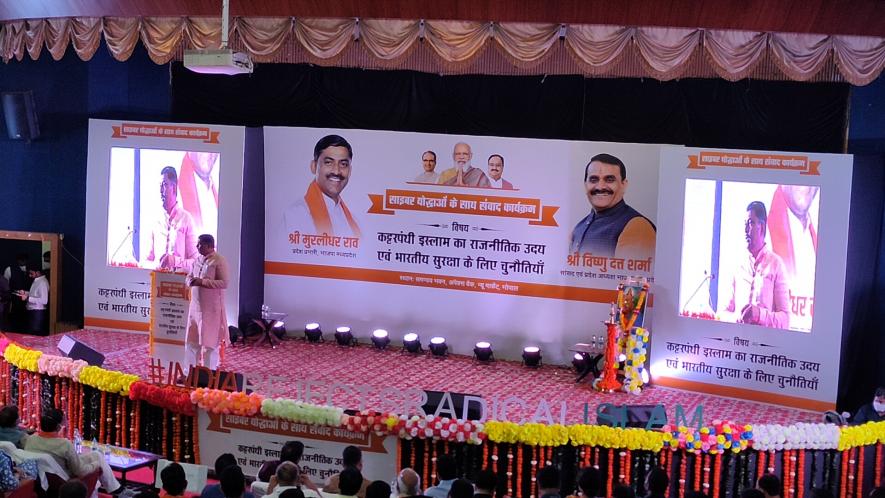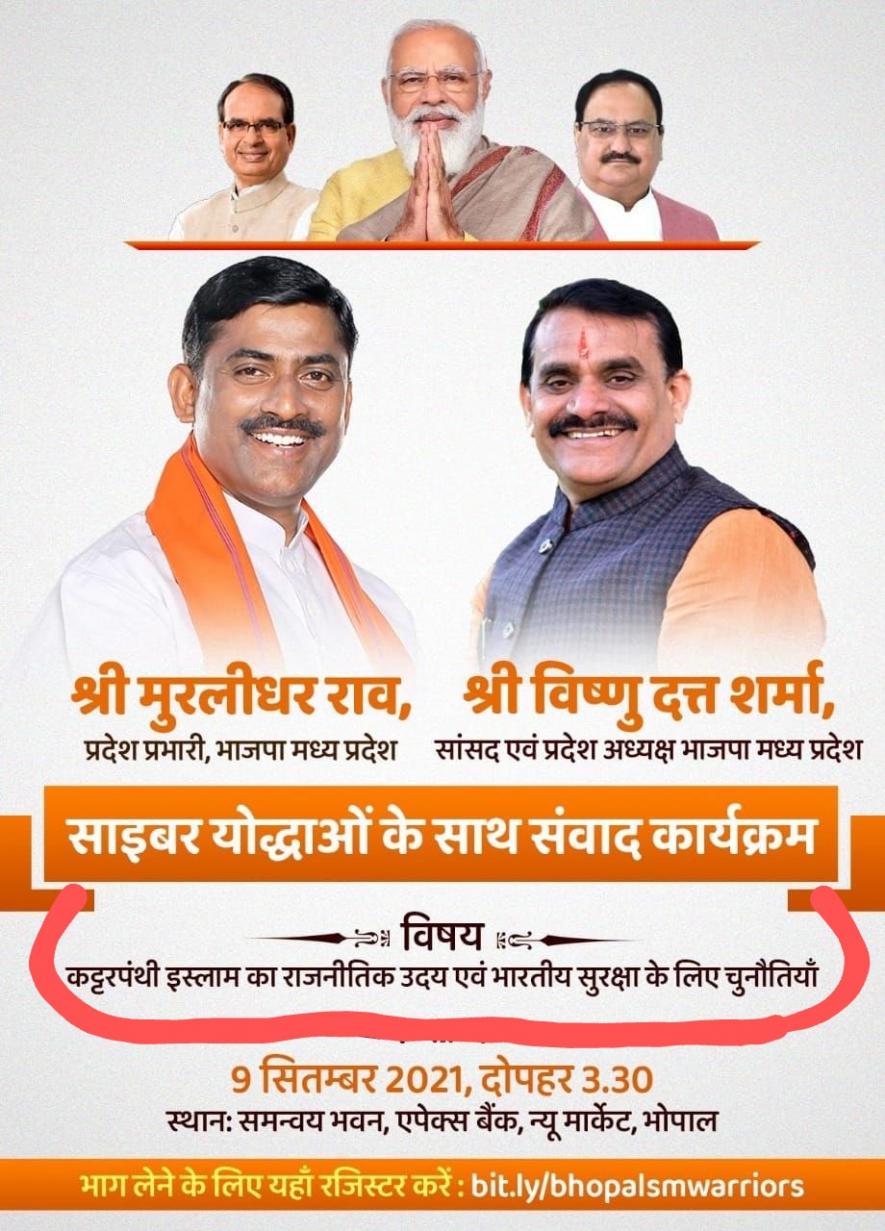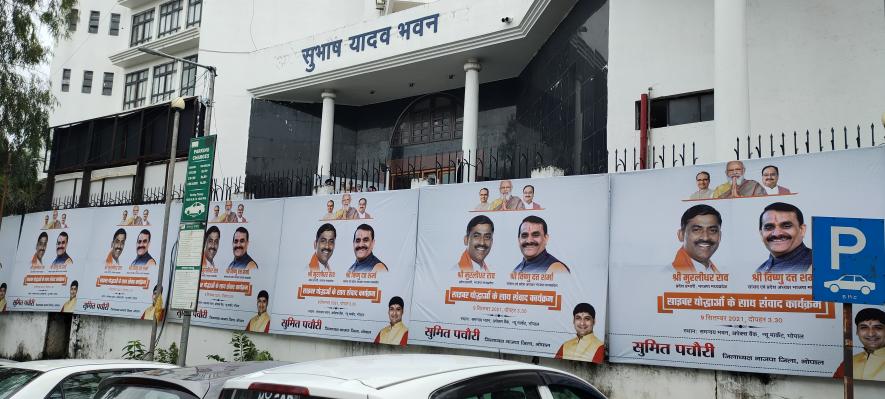Taliban is Latest BJP Tool to Counter Anti-incumbency in Madhya Pradesh

The Taliban takeover of Afghanistan, considered as the ‘rise of radical Islam’, seems to have become the latest tool of the ruling Bharatiya Janata Party (BJP) in Madhya Pradesh to consolidate its majoritarian vote bank and tide over anti-incumbency, failure in governance and setbacks during the pandemic.
The BJP organised a seminar for its IT cell workers titled ‘Kattarpanti Islam kaa Rajnaitik Uday evam Bhartiya suraksha ke liye chunautiya’ (The political rise of radical Islam and the challenges to India’s security) in Bhopal on September 9. More than 500 IT cell workers, identified as ‘cyber warriors’, participated in the seminar to handle the social media accounts of ministers, MPs and MLAs.
“Is desh ke upar kattarpant Islam kaa aakraman jab bhi hua hai toh wahin (Afghanistan) se hua hai. Bhopal bhi pahuncha toh wahi se aaya hai, Hyderabad bhi pahuncha toh wahi se aaya hai (Whenever radical Islam has invaded the country, it was from Afghanistan—whether Bhopal or Hyderabad),” said P Muralidhar Rao, BJP state-in-charge, during the seminar.
Drawing parallels with Afghanistan, in his 30-plus-minutes of speech, Rao pointed out that the new Taliban government does not represent women and ethnic minorities. If radical Islam rises in India, the rights of Indians, including Muslims, especially women, will be taken away, he said. Therefore, not only Hindus but Muslims should also join the fight the rise of radical Islam, Rao added.

The seminar assumes significance as it was the first public gathering held by Rao in Madhya Pradesh since he was handed over the charge of the state by party president JP Nadda in November last year.
Earlier during the seminar, Madhya Pradesh BJP president VD Sharma compared the state of India’s security before and after Narendra Modi became the prime minister by pointing out that no major terrorist or Maoist attacks occurred in the last seven years. “When Congress was in power, Army officers on Bangladesh border were compelled to use guns as sticks. But in the BJP regime, the Army can take decisions which suit the interests without New Delhi’s approval,” he said.
Both Rao and Sharma emphasised that prior to the Modi regime, radical forces found a footing in the country because they had sympathisers in the government. Referring to senior Congress leader and former chief minister Digvijay Singh’s 2013 comment in which he had called the cofounder and head of terror outfit Lashkar-e-Taiba as “Hafiz Saeed Ji”, Rao said, “There were leaders in the government who addressed them as ‘Osama Ji’, ‘Laden Ji’ and ‘Taliban Ji’. But now it’s time to take a stand against these forces for the sake of the country.”
“In such a situation when battles are being fought in the cyber space”, Rao and Sharma pointed out that “the role of cyber warriors is important to stop such radical forces”. “Cyber warriors in the coming days will have to destroy those with a radical mindset at the click of their buttons. Because if they survive, the sacrifices made by our generation will be wasted,” Rao said. The event ended with the hashtag #India-Rejects-Radical-Islam trending on Twitter.
Earlier, Madhya Pradesh home minister Narottam Mishra had said that people who think like the Taliban will be thrashed. Medical education minister Vishwas Sarang and BJP MLA from Bhopal’s Huzur constituency Rameshwar Sharma had made controversial remarks on the Taliban as well. The state BJP leadership is not only using the Taliban jab to divert people’s attention from the core issues but also against the opposition Congress to show it in poor light by terming them as ‘sympathisers of the group’.
On August 31, Mishra went a step further and alleged that one of the protesters against the arrest of a Muslim bangle seller who was thrashed in Indore had links with the Taliban. On Tuesday, Mishra said that the man was not only linked to “Pakistani elements”, but investigation had also revealed that he had a “chat with the Taliban on social media”.

On the one hand, BJP’s Madhya Pradesh leaders are making controversial remarks against the Taliban, on the other hand, the Indian ambassador to Qatar, Deepak Mittal, had met the Taliban’s head of political office in the Gulf nation Sher Mohammad Abbas Stanekzai on August 31 to address the safety and security of Indian nationals stranded in Afghanistan.
As per the official communiqué of the ministry of external affairs, which officially acknowledged the first-ever such meeting between the two sides, “Discussions were focussed on safety, security and early return of Indian nationals stranded in Afghanistan. The travel of Afghan nationals, especially minorities, who wish to visit to India also came up. Ambassador Mittal raised India’s concern that Afghanistan’s soil should not be used for anti-Indian activities and terrorism in any manner.”
The number of atrocities against SCs, STs and Muslims in the state has increased with the state government facing increasing heat. “The BJP is using the Taliban plank and the rise of radical Islam to counter these issues,” a senior journalist who reports on the BJP told Newsclick.
Get the latest reports & analysis with people's perspective on Protests, movements & deep analytical videos, discussions of the current affairs in your Telegram app. Subscribe to NewsClick's Telegram channel & get Real-Time updates on stories, as they get published on our website.
























